
Sir Raymond Douglas Davies is an English musician. He was the lead vocalist, rhythm guitarist and primary songwriter for the rock band the Kinks, which he led with his younger brother Dave on lead guitar and backing vocals. He has also acted in, directed and produced shows for theatre and television. Known for focusing his lyrics on rock bands, English culture, nostalgia and social satire, he is often referred to as the "Godfather of Britpop", though he disputes this title. He was inducted into the Rock and Roll Hall of Fame as a member of the Kinks in 1990. After the dissolution of the Kinks in 1996, he embarked on a solo career.
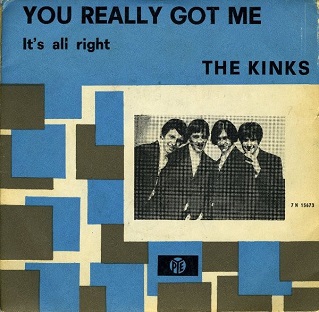
"You Really Got Me" is a song by English rock band the Kinks, written by frontman Ray Davies. The song, originally performed in a more blues-orientated style, was inspired by artists such as Lead Belly and Big Bill Broonzy. Two versions were recorded, with the second performance used for the final single. Lead guitarist Dave Davies performs the song’s famous guitar solo. Although it was long rumoured that future Led Zeppelin guitarist Jimmy Page had performed the song's guitar solo, this has been debunked by Page himself.

Face to Face is the fourth studio album by the English rock band the Kinks, released on 28 October 1966. The album marked a shift from the hard-driving style of beat music that had catapulted the group to international acclaim in 1964, instead drawing heavily from baroque pop and music hall. It is their first album consisting entirely of Ray Davies compositions, and has also been regarded by critics as one of rock's first concept albums. Davies' blossoming songwriting style became increasingly observational and satirical, commenting on English culture, social class and the music industry.
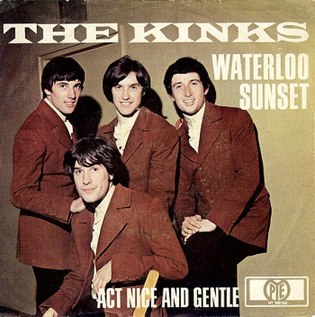
"Waterloo Sunset" is a song by English rock band the Kinks. It was released as a single on 5 May 1967 and featured on the album Something Else by the Kinks later that year. Written and produced by Kinks frontman Ray Davies, "Waterloo Sunset" is one of the band's best-known and most acclaimed songs, and was ranked number 14 on the 2021 edition of Rolling Stone's 500 Greatest Songs of All Time list. It was also their first single that was available in true stereo.

Arthur (Or the Decline and Fall of the British Empire), often referred to as just Arthur, is the seventh studio album by the English rock band the Kinks, released on 10 October 1969. It was the first Kinks album to feature bassist John Dalton, who replaced Pete Quaife. Kinks frontman Ray Davies constructed the concept album as the soundtrack to a Granada Television play and developed the storyline with novelist Julian Mitchell; the television programme was never produced. The rough plot revolved around Arthur Morgan, a carpet-layer, who was based on Ray and guitarist Dave Davies' brother-in-law Arthur Anning. A stereo version was released internationally with a mono version being released in the UK, but not in the US.

Lola Versus Powerman and the Moneygoround, Part One, commonly abbreviated to Lola Versus Powerman, or simply Lola, is the eighth studio album by the English rock band the Kinks, released on 27 November 1970. A concept album, it is a satirical appraisal of the music industry, including song publishers, unions, the press, accountants, business managers, and life on the road. Musically Lola Versus Powerman is varied, described by Stephen Thomas Erlewine as "a wildly unfocused but nonetheless dazzling tour de force", containing some of Ray Davies's strongest songs.

"Lola" is a song by the English rock band the Kinks, written by frontman Ray Davies for their 1970 album Lola Versus Powerman and the Moneygoround, Part One. The song details a romantic encounter between a young man and a possible cross-dresser or trans woman, whom he meets in a club in Soho, London. In the song, the narrator describes his confusion towards Lola, who "walked like a woman but talked like a man", yet he remains infatuated with her.

The Kinks were an English rock band formed in London in 1963 by brothers Ray and Dave Davies. They are regarded as one of the most influential rock bands of the 1960s. The band emerged during the height of British rhythm and blues and Merseybeat, and were briefly part of the British Invasion of the United States until their touring ban in 1965. Their third single, the Ray Davies-penned "You Really Got Me", became an international hit, topping the charts in the United Kingdom and reaching the Top 10 in the United States.

"Shangri-La" is a song written by Ray Davies of the Kinks. The song appeared on the 1969 concept album, Arthur. The song's inspiration can be traced back to when the band visited the Davies brothers' sister, Rose, and her family in Australia, the "designed community" that the family lived in serving as the initial lyrical inspiration. The song's highly ironic lyrics comment on British class society while portraying Arthur, the album's ill-fated protagonist, and his empty life in the suburbs. The musical aspects of the song both reflect and comment on the mood of the lyrics.

"Celluloid Heroes" is a song performed by the Kinks and written by their lead vocalist and principal songwriter, Ray Davies. It debuted on their 1972 album Everybody's in Show-Biz.

"See My Friends" is a song by the English rock band the Kinks, written by the group's singer and guitarist, Ray Davies. Released in July 1965, it reached number 10 on the Record Retailer chart. The song incorporates a drone-effect played on guitar, evoking a sound reminiscent of the Indian tambura.

Crouch End Festival Chorus (CEFC) is a symphonic choir based in north London which performs in a range of musical styles, including traditional choral repertoire, contemporary classical, rock, pop and film music.
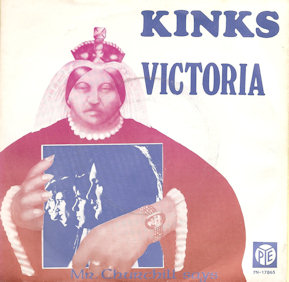
"Victoria" is a song written by Ray Davies of the Kinks. It is the opening track on the band's 1969 concept album Arthur .
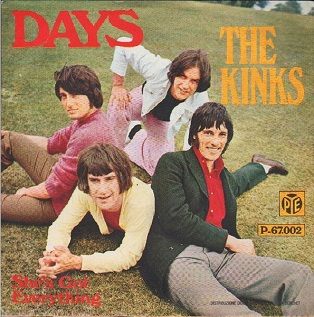
"Days" is a song by the Kinks, written by lead singer Ray Davies, released as a single in 1968. It also appeared on an early version of the album The Kinks Are the Village Green Preservation Society. It now appears as a bonus track of the remastered CD. On the original Pye 7N 17573 label, the name of the song is "Day's" owing to a grammatical error.
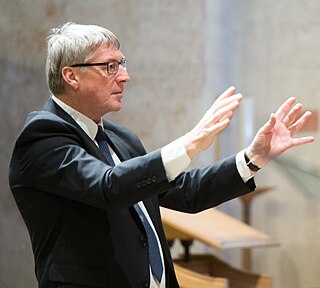
David Anthony Temple is a British conductor and musical director of Crouch End Festival Chorus and Hertfordshire Chorus. He has conducted at the Barbican Centre, Royal Festival Hall and Symphony Hall, Birmingham, Royal Albert Hall, Sage Gateshead, The Roundhouse, Snape Maltings and St Albans Cathedral.

"Better Things" is a song by The Kinks, released as a single in June 1981 in the UK and November 1981 in the US. A slightly shorter version was later released on their album Give the People What They Want.

"Come Dancing" is a 1982 song written by Ray Davies and performed by British rock group the Kinks on their 1983 album State of Confusion. The song was inspired by Davies' memories of his older sister, Rene, who died of a heart attack while dancing at a dance hall. The lyrics, sung from the perspective of an "East End barrow boy," are about the boy's sister going on dates at a local Palais dance hall.
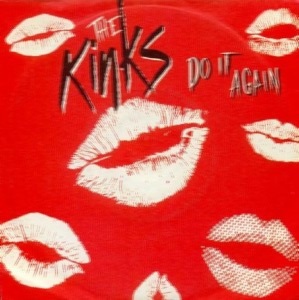
Do It Again is a song by British rock band the Kinks. Written by lead singer Ray Davies, the song was released as the first track on The Kinks's album, Word of Mouth. Written as an observation on stressful working schedules, the song features an opening guitar chord and echoed vocals.

"Sleepwalker", written by Ray Davies, is the third track from The Kinks' 1977 album of the same name.

"Lost and Found" is the second track from Think Visual, a 1986 album by The Kinks. It was written by The Kinks' primary songwriter, Ray Davies.




















